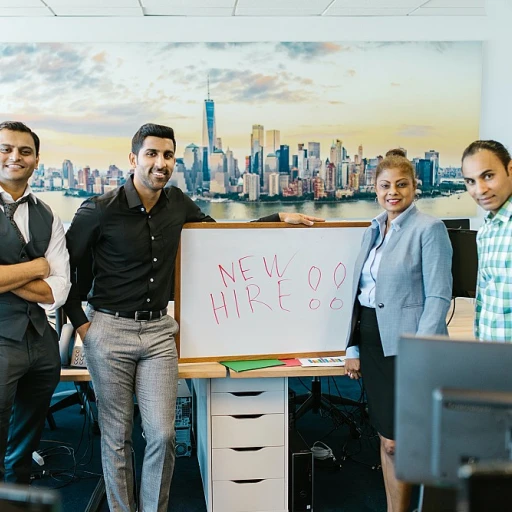
Understanding the Role of a Mentor
The Significance of Having a Mentor in Your Professional Journey
A mentor plays a pivotal role in an individual's professional and personal development. Mentoring is more than just providing guidance; it is about forming a supportive relationship that fosters growth and learning. Mentors offer their time and support, sharing their invaluable experience and wisdom to help mentees navigate the complexities of their careers. Understanding the multifaceted nature of mentorship is crucial for both mentors and mentees. A mentor's guidance can be transformative, offering a new perspective on professional challenges and opportunities. This support can lead to significant career advancements and personal growth. Mentorship is not a one-way street. For a relationship to flourish, mentees must express gratitude and appreciation. Recognizing the effort and dedication of a mentor is essential. This helps in strengthening the mentor-mentee relationship, fostering a deeper connection, and promoting a continuous cycle of learning and mentorship. In professional settings, mentors serve as role models whose expertise can inspire and influence. They are often the catalysts for change, helping mentees achieve their goals and aspirations. The benefits of mentoring are extensive and can have a long-lasting impact on an individual's career and life. For more insights on fostering a growth mindset and achieving professional success, explore the mindset of successful individuals. This resource offers valuable perspectives on leveraging mentorship for career advancement.The Importance of Gratitude in Mentoring
The Significance of Expressing Thanks in a Mentoring Context
In the landscape of professional growth and development, the act of expressing gratitude towards one's mentor holds significant weight. While a mentorship relationship is built on mutual understanding, respect, and shared goals, the role of gratitude cannot be overstated in reinforcing these bonds and enhancing the overall experience. Firstly, gratitude and appreciation serve as core pillars of any mentoring relationship, enhancing mutual respect and collaboration. When you express gratitude for a mentor's time, guidance, and support, it reaffirms their impact on your career and life. It reminds mentors that their efforts are valued and motivates them to continue their valuable work in cultivating talent. Moreover, consistently recognizing a mentor's contributions fosters a sense of shared success. It builds a positive environment where mentors feel appreciated, and mentees feel supported. This mutual acknowledgment can lead to increased morale and motivation, further strengthening the mentoring relationship. Expressing gratitude also plays a crucial role in personal and professional development. By consciously acknowledging the support and guidance you receive, you cultivate an attitude of appreciation that permeates other areas of your life. This mindset encourages professional growth and opens doors for future opportunities. Furthermore, the act of receiving gratitude can inspire mentors themselves. Seeing tangible results of their mentorship and hearing how their guidance supported your growth can be incredibly rewarding for them. This positive reinforcement can lead to continual adjustments and improvements in their mentoring approach, benefiting future mentees as well. For an in-depth exploration of how such relational dynamics tie into broader theories of empowerment, you might find it insightful to read more about Understanding Empowerment Theory in Social Work. It expands on how gratitude and empowerment in mentoring can transform not just individuals, but also entire communities.Ways to Thank Your Mentor
Ways to Show Appreciation to Your Mentor
Expressing gratitude to your mentor does not have to be complicated, yet it can greatly strengthen your mentoring relationship. Recognizing the time and support they have provided is crucial. Here are some thoughtful ways to convey your appreciation:
- Write a Letter or Note: A handwritten letter mentor note can express your gratitude in a personal and tangible way. Mention specific instances where their guidance has made a positive impact on your career or life, highlighting why you're thankful for their mentorship.
- Share Appreciation Quotes: Including a few appreciation quotes can add a touch of eloquence to your messages. Quotes can underscore your sentiment and make your gratitude message feel more profound.
- Send a Thoughtful Gift: While not necessary, a small token of appreciation can be a nice gesture. It could be something that reflects their interests or contributions to your professional growth.
- Public Acknowledgment: Expressing gratitude in a public forum, such as a LinkedIn post or during a professional meeting, not only celebrates your mentor's influence but also inspires others. Acknowledging your mentor's support and guidance in front of peers can be a powerful testament to their contribution.
- Quotes or Messages: Sharing powerful mentor quotes or crafting messages mentor-centric can emphasize specific ways they have influenced you.
- Continued Professional Engagement: Engage in ongoing communications and updates about your progress. This ongoing interaction can reaffirm your appreciation for their guidance support.
By integrating these gestures into your interactions, you can effectively express gratitude and show appreciation for the instrumental role your mentor plays in your career development. For innovative techniques on expressing appreciation, explore more about innovative mentoring techniques.
Crafting a Heartfelt Thank You Message
Crafting a Meaningful Message of Appreciation
Expressing gratitude to your mentor can be a deeply rewarding experience, both for you and your mentor. A well-crafted thank you message can convey your appreciation for the time, support, and guidance they have provided throughout your mentoring relationship. Here are some tips to help you write a heartfelt note that truly reflects your gratitude.
Start by reflecting on the specific ways your mentor has impacted your life and career. Mention specific instances where their guidance and support made a difference. This not only personalizes your message but also shows that you value the unique contributions they have made to your professional growth.
- Be Specific: Instead of a generic thank you, mention specific advice or support that helped you overcome challenges or achieve goals. This could be a piece of career advice, a skill they helped you develop, or a particular instance where their support was crucial.
- Express Sincere Gratitude: Use genuine language to express your appreciation. Avoid overly formal language; instead, let your natural voice shine through. This authenticity will resonate more with your mentor.
- Include Mentor Quotes: If your mentor has shared any memorable quotes or wisdom, consider including them in your message. This not only shows that you were attentive but also highlights the lasting impact of their words.
- Keep It Professional: While it's important to be personal, maintain a professional tone. This balance will ensure your message is both heartfelt and respectful.
Remember, a thank you message is not just about expressing gratitude; it's also about reinforcing the mentor-mentee relationship. By acknowledging the role your mentor has played in your life, you are strengthening the bond and paving the way for continued support and guidance in the future.
Incorporating these elements into your thank you message will not only express your gratitude but also honor the invaluable role your mentor has played in your journey. Whether it's a handwritten letter or a thoughtful email, your message will be a testament to the positive impact of mentorship.
Maintaining the Mentor-Mentee Relationship
Nurturing a Lasting Bond with Your Mentor
Maintaining a strong mentor-mentee relationship is pivotal for long-term professional growth. This bond is built on mutual respect, regular communication, and genuine gratitude. As you continue to nurture this relationship, it’s important to remember the fundamental principles that make mentoring effective.
Expressing gratitude doesn't end with a single message or token of appreciation. It’s an ongoing effort to show your mentor how much you value their time, support, and guidance. Regularly acknowledge the role your mentor plays in your life, whether through a thoughtful note or a spontaneous message of appreciation.
Keeping communication open is essential. Regular check-ins, updates on your career progress, or sharing achievements are excellent ways to keep your mentor invested in your journey. When you share these milestones, make sure to mention specific pieces of advice or mentor guidance that have been impactful. This not only expresses gratitude but reinforces the importance of their support and mentorship.
Additionally, incorporating mentor quotes and lessons into your professional life can serve as a tribute to their influence. Sharing your successes and crediting your mentor's help offers them recognition and shows how their input has shaped your path.
Your responsibility as a mentee also includes supporting your mentor in any way you can. Whether that’s by attending events where they speak or suggesting new ideas for their projects, showing active interest in their work can enhance your connection.
Ultimately, a strong mentoring relationship contributes to both personal and professional advancement. As you express gratitude and appreciation towards your mentor, you reinforce a cycle of positive support and guidance.













